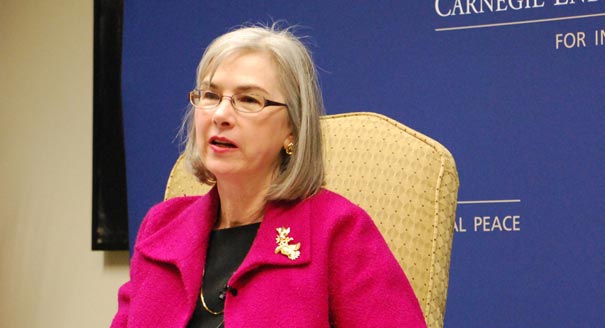Registration
You will receive an email confirming your registration.
Ambassador Susan Burk, special representative of the president for nuclear nonproliferation, discussed progress on implementing the Nuclear Non-Proliferation Treaty (NPT) Action Plan, adopted at the 2010 Review Conference to strengthen the Treaty’s three pillars. She also addressed the upcoming 2012 NPT Preparation Committee meeting and beyond, with an emphasis on the role of the next generation of nuclear specialists in bolstering the nonproliferation regime. This event was held in conjunction with the International Network of Emerging Nuclear Specialists (INENS) in London, with U.K. audience participation via videoconference from the U.S. Embassy in London. Toby Dalton moderated from the Carnegie Endowment in Washington. Meena Singlee moderated from London.
The First Preparatory Committee (PrepCom)
- 2010 NPT Review Conference: At the last NPT Review Conference (RevCon), NPT parties produced by consensus a substantive, balanced Action Plan for progress on the NPT’s three pillars: disarmament, nonproliferation, and peaceful use of nuclear energy. Amb. Burk said that the 2010 result demonstrated the ability of treaty parties to reach across traditional blocs to find common ground and adopt a final document. The United States is looking to use the 2010 RevCon and Action Plan as a point of departure for the 2015 review cycle, she added.
- Implementation: Amb. Burk said the PrepCom is an opportunity for all parties—nuclear weapon and non-nuclear weapon states alike—to describe their efforts to implement the Action Plan. She stressed the importance of engaging with countries on a continual and persistent basis to establish the diplomatic framework for 2015.
- Engaging Experts: The PrepCom will take place in Vienna, thereby providing a great opportunity to engage Vienna missions, the Comprehensive Nuclear-Test-Ban Treaty Organization (CTBTO) and IAEA experts in the Action Plan, Amb. Burk noted. The IAEA in particular will be important to achieving the plan’s safeguards and technical cooperation goals.
Progress on the 2010 Action Plan
- Disarmament: President Obama recently reaffirmed the U.S. commitment to moving towards a world without nuclear weapons. Amb. Burk pointed out the Obama administration has taken many strides to advance this vision, including reducing the role of nuclear weapons in its national security strategy, bringing the plutonium management agreement and its protocols into force with Russia, and taking the lead on increasing nuclear weapons transparency. Lastly, Washington is actively engaged with its P-5 partners on Action 5 of the Action Plan, which calls for nuclear-weapon states to “commit to accelerate concrete progress on the steps leading to nuclear disarmament,” she said.
- Nonproliferation: The Action Plan called upon all states to bring into force comprehensive safeguards agreements and additional protocols. The United States is working, along with the IAEA and partners in Vienna, to help states that have not already done so to adopt these measures, she said. Amb. Burk also emphasized the importance of compliance with nonproliferation obligations and the responsibility of all NPT members to respond firmly to NPT violations, including those that involve abuse or misuse of technical assistance that states may have received under the auspices of NPT membership.
- Peaceful Uses: The 2010 Action Plan affirms the central role of the NPT in fostering the development of the peaceful uses of nuclear energy. Amb. Burk said that the United States has long been the single largest contributor to the IAEA’s technical cooperation program. In 2010, the United States pledged $50 million to the Peaceful Uses Initiative, which provides developing countries with training and equipment to apply nuclear technologies, particularly in the area of human health. The United States has already disbursed more than $18 million for IAEA projects, she added.
Role of the Next Generation
- Youth Participation: Amb. Burk stressed the importance of engagement by young people in international nonproliferation issues and security issues more broadly. There has been an increase in youth participation in the most recent NPT RevCon due to the emergence of new NGOs and networks created to engage students and young professionals, such as INENS and the European Youth Delegation, she said.
- The Prague Generation: Realistically, achieving the vision that President Obama set out in Prague for a world without nuclear weapons will take time, Amb. Burk noted. However, she concluded that she takes comfort knowing that there is much enthusiasm and intellect being rallied among the “Prague Generation” to take these issues on in the future.
